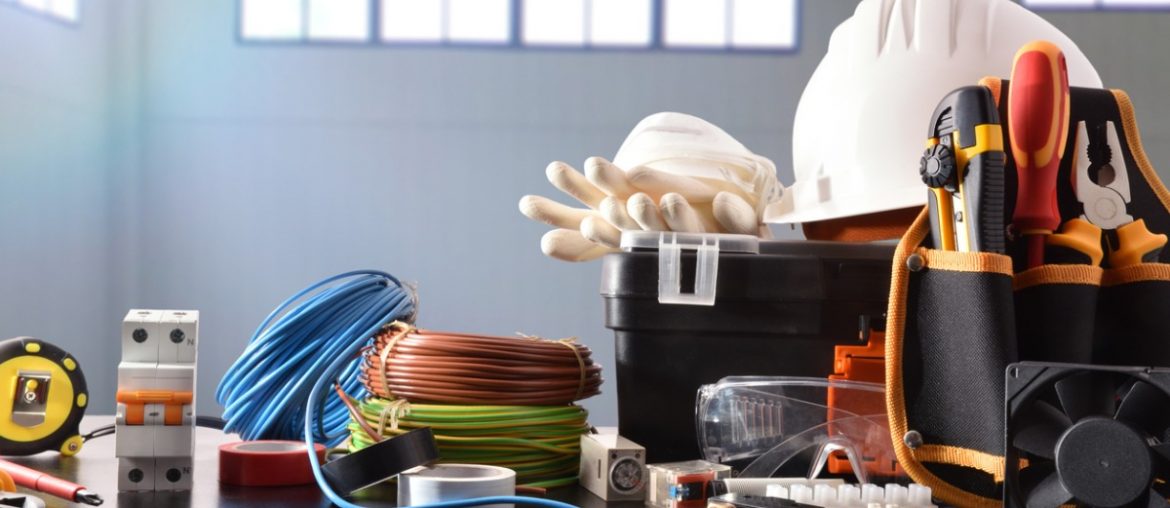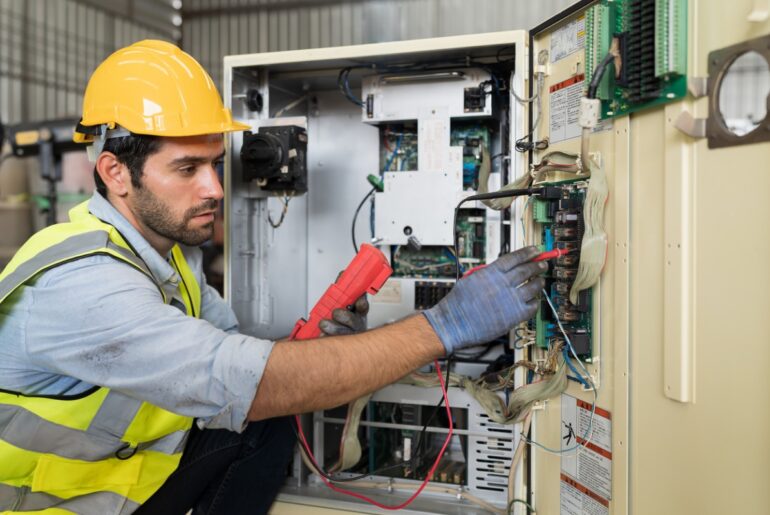As an electrician, your toolkit is your most trusted companion. You will not only take these tools wherever you go, but you will also rely on them for the better part of your career.
Also, having the proper electrical tools is vital for your job’s success. For this reason, we have compiled a list of 25 essential electrician tools. We have divided these indispensable tools for professional electricians into categories for better understanding.
- Basic and Essential Electrician Tools
- 1. Pliers
- 2. Tape Measure
- 3. Insulated Screwdriver
- 4. Drill
- 5. Cable Ties
- 6. Insulation Tape
- 7. Reaming Bit
- 8. Level
- 9. Wire Stripper
- 10. Wire Cutters
- 11. Fish Tape
- 12. Hack Saw
- 13. Receptacle Tester
- 14. Flashlight
- 15. Splice Connector
- 16. Voltage Tester
- 17. Wrench
- 18. Knife
- 19. Hammer
- 20. Multimeter
- Protective Tools
- 21. Electrician Gloves
- 22. Protective Eyewear (Safety Glasses)
- 23. Workshirt
- 24. Tool Belt
- 25. Hook
- Technological Tools (Specialized Tools)
- 26. Circuit Analyzers
- 27. Electrical Contractor Software
- Closing Thoughts
Basic and Essential Electrician Tools
Let’s get into these must-have tools list: Here are some of the basic and essential electrician tools that every electrician should have in their tool kit:
1. Pliers
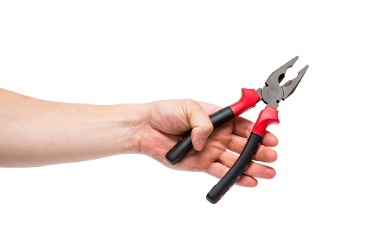
A pair of pliers might be the most basic electrician tool. These essential hand tools are used to accomplish several tasks that require ‘torque .’ Their most significant selling point is that they enable you to complete tasks much more robustly than when using bare hands. Most (if not all) adjustable pliers are made of steel for extra strength and grip.
There are different types of pliers that make them one of the most versatile tools, each of which is designed for a specific task. These electrician hand tools include long-nose pliers (needle-nose pliers), water pump pliers, side-cutting pliers, mole grips, needle noses, and combination pliers.
2. Tape Measure
An electrician’s job requires you to measure a lot. For example, you need measurements when locating light fixtures, running conduits, mounts, and mounting outlet boxes. Most tape measures feature a graduated blade inside a plastic casing.
It would be best to go for a tape measure with a heavy-duty blade to get the most out of it. Such blades won’t collapse even at full stretch. Also, a tape measure with a magnetic tip eases the measuring task since the blade can conveniently hang on when butted upon a metallic surface.
3. Insulated Screwdriver
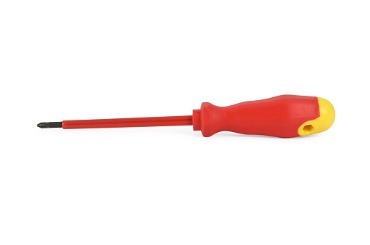
Insulated screwdrivers take you through every bit of your job. Having a single screwdriver is good, but investing in a whole set of insulated tools like electrical hand tools is better. Insulated hand tools like screwdrivers come in handy in mounting outlet boxes, installing wall plates, fixing light fixtures, and much more. The insulation is an extra step for protection should the screwdriver accidentally come into contact with an energized wire.
4. Drill
As you might already know, an electrician’s job involves a lot of drilling. A power tool, such as a power drill, is suitable for handling such tasks. It has an electrical motor that rotates a drill bit at high speed. This movement creates a hole in different materials. Some drills can also take screwdriver bits, thus allowing easier fastening of screws in a material.
An electric drill also helps you assemble and disassemble installed items whenever you want to access the wiring components inside. There are different types of drill bits, and you can easily replace them when working.
5. Cable Ties
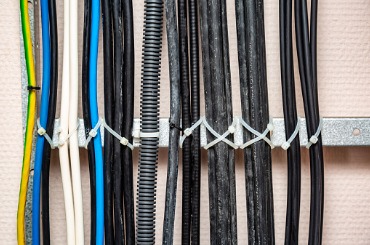
Also known as zip ties, cable ties keep electrical wires bundled up. These items hold wires in place and prevent them from getting in your way whenever you are working.
Cable ties are a lifesaver, especially for electricians working with many wires. Most of them are made using nylon. They have a flexible tape part with teeth and a pawl in the head. The free end of a cable tie is pulled to tighten the electrical cable. Once tightened, the tie cannot be undone.
6. Insulation Tape
Also known as electrical tape, insulation tape is used to insulate wire and other items that can conduct electricity. The tape is pressure-sensitive and self-adhesive. They offer maximum protection to the conducting core, protecting it from abrasion, liquids, and heat.
Insulation tapes are made using different materials. The most common ones include PVC, copper foil, glass cloth, and vinyl.
Also, they have varying thickness, color, adhesion strength, and tolerance to temperatures. The color is vital since electricians use them to color-code wires when working with them. However, black is the most common color and is universally accepted for general insulation purposes.
7. Reaming Bit
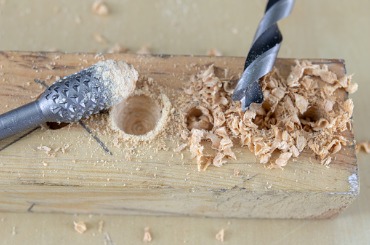
Every electrician knows the importance of having a secure cable path between two electrical components. They, therefore, use reaming bits as part of your tool kit to install new pipes and remove existing ones. These bits connect to an electric drill, thus stretching the gap on the pipe’s end to connect to another piping session. Electricians fancy these items because of how securely they complete the piping.
8. Level
You do not want your final work to appear crooked or unprofessional, and that’s where the level comes in. You need to install light fixtures and other items right away. To do so, you use a level to find the precise points when installing them. It ensures that all the things have been installed precisely where they should be.
9. Wire Stripper
A wire stripper has graduated holes along the length of the jaws to help you with your stripping requirements. Therefore, you do not have to gamble with cabling knives and pliers since the wire strips do the job correctly and on the first try. You match the size of the wire being stripped with a suitable graduated hole. The good thing about them is that they remove the insulation without damaging the wire inside.
10. Wire Cutters
These tools are designed to cut through different types of wires, cables, and conductors with ease. They come in various sizes and shapes to accommodate different wire gauges and cutting requirements.
Wire cutters, or cable cutters, have sharp blades that make clean and precise cuts without damaging the wire strands inside. This is important to ensure proper connectivity and safety in electrical installations. Some wire cutters also have additional features, such as insulated handles for added protection against electric shocks.
11. Fish Tape
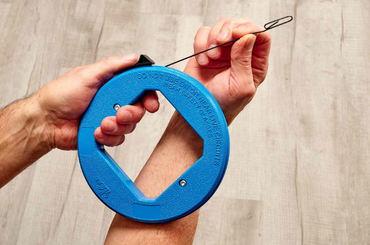
An electrician can’t work without fish tape. Using it, you can easily guide and route wires through conduits and walls that you wouldn’t have been able to access in any other way. They are rigid and flexible, making it easy to use them.
Fish tapes are made using fiberglass, steel, and stainless steel materials. Before purchasing one, you need to consider the tensile strength and the length you are working with. Also, the type of wire you are working with matters. However, the best one to buy would be steel, of the three materials.
Get Started With Electrical Contractor Software!
12. Hack Saw
Hacksaws are just saws with finer teeth. They are primarily designed to cut through metal, but you can also use them to cut through other materials.
Hacksaws feature a thin blade held in a frame. You can adjust this frame to your liking, too!
A typical full-sized hacksaw has a 12-inch blade. However, smaller hacksaws (also known as junior hacksaws) are smaller in size and have finer teeth to cut more precisely.
13. Receptacle Tester
Also known as an electrical outlet tester, a receptacle tester is a small electrical tool with a power plug and indicator lights. The device’s only job is to detect incorrectly wired electrical outlets quickly.
14. Flashlight
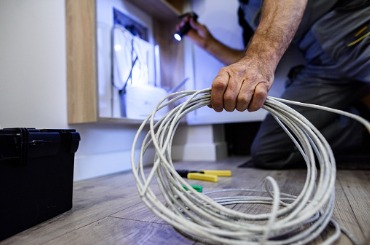
As we all know, flashlights provide illumination without necessarily using electricity. You can control the beam of light produced for specific tasks.
Electricians use flashlights all the time. Working in the dark is a potential risk, especially when dealing with live wires. Also, you might be required to switch off the entire electrical system of the premises when working, which only calls for an alternative lighting source.
15. Splice Connector
Splice connectors are plastic clips used to terminate wires safely or connect them safely. They have a simple design and are easy to use. You just insert the wires into the connector and crimp with pliers. If you want to terminate a wire, you will have to clip the other end. You will insert the wire on the other end and repeat the procedure for the wire-to-wire connections.
16. Voltage Tester
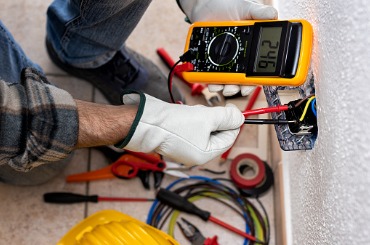
It is imperative for every electrician to know when/if a wire is live. Failure to do so would result in dangerous occurrences, some of which might even be fatal. Therefore, a contact voltage tester and a non-contact voltage tester are up there on the list of most important electrician tools. This tool notifies you whether a wire has any voltage without necessarily making contact with it.
The size of a voltage tester might not matter a lot, but it is safe to say smaller testers are more convenient than bigger ones.
17. Wrench
A wrench is vital for every electrician, as it helps with tightening requirements. They are used to tighten conduits, connectors, conduit fittings, and gang boxes. You can also use them to attach and loosen nuts.
Wrenches come in different sizes. The most commonly used ones are 7/16, 9/16, and 1/ 2.
18. Knife
There is no limit to the number of things required to be cut on-site for an electrician. Most of them carry a knife or blade for general purposes, for example, stripping wires quickly. Better still, you can find some utility knives in the market specifically designed for this trade. Such blades are stronger, smaller, and have enough insulation.
19. Hammer
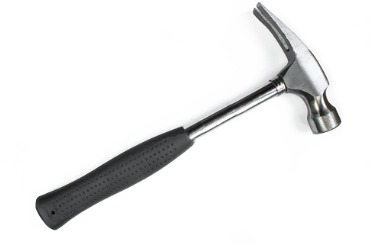
As an electrician, you will probably use your hammer every day; there are many things to secure and a lot more to tear apart. However, you do not need an expensive one to complete these tasks. In fact, a simple 16-inch hammer will get the job done just fine.
Some electricians also use the hammer as a measuring stick when installing items such as outlet boxes. You can use the length as a standard unit of measurement from the floor to the boxes.
20. Multimeter
As its name implies, a multimeter measures different electrical properties in a circuit. Conventional multimeters had a needle-like structure that pointed to the value of the electrical property being tested. However, digital multimeters are much more advanced.
They have sophisticated features such as lights, Bluetooth connectivity, and even thermal imaging cameras. Better still, they provide precise readings.
You might come across a multimeter with an amp clamp. Such gadgets have jaws at the top that measure electrical properties without interfering with the circuit.
Protective Tools
21. Electrician Gloves
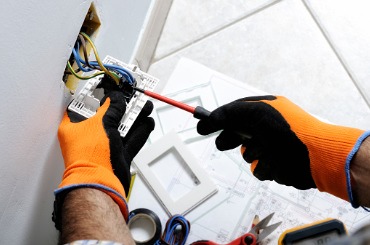
When working with electricity, you will find yourself in situations of potential hazards where electrical insulating gloves are the only thing standing between you and a high-voltage current. They protect you from potential electrical shock due to currents from energized wires.
Electric safety gloves are insulated with materials such as rubber for additional safety. This way, no current can reach your body, no matter how high it is, as long as you are wearing rubber-insulating gloves. Being the first line of defense, you need to get the best electric rubber gloves possible. They should fit properly in your hand without compromising on comfort.
22. Protective Eyewear (Safety Glasses)
Protective eyewear is meant to protect you from job-related eye injuries when working with electricity. Proper eye protection actually prevents more than 90% of these injuries, especially if you wear it correctly and at all times. Most of these injuries are caused by flying objects and particles such as dust, metal chippings, wood chips, and even concrete particles.
When shopping for eyewear, ensure that you go for certified products. It would be best to do so because they must meet some specific criteria to protect you fully. For example, you should go for eyewear with strong safety frames and lenses that can withstand impact.
23. Workshirt

Working with electricity on a daily basis is a risky job with the risk of injury. Therefore, a technician’s protective clothing keeps them safe and gives them peace of mind when working.
An electrician’s work shirt is protective clothing made using fire-retardant materials. Such materials are chemically treated so as to decrease the possibility of your skin coming into contact with electrical work hazards. Most of them are made using cotton and nylon.
Electrician work shirts are lightweight, breathable, and well-fitting. They shouldn’t be overly tight, as you still want to move freely when going about your business. If you want the perfect work shirt, look for the one with the right combination of function, comfort, and safety.
24. Tool Belt
A tool belt is an essential accessory for any electrician to have while on the job. It allows you to keep your most-used tools close at hand, making it easier and more efficient to complete tasks quickly and effectively. A good tool belt, or tool pouch, should be durable, comfortable to wear, and have enough storage space for all your necessary tools.
When choosing a tool belt, consider the material it is made of, the number and size of pockets, the type of closure (buckle or Velcro), and the overall fit. Look for a tool belt that distributes weight evenly to prevent strain on your back and hips.
25. Hook
These rescue rods are used to remove big objects from dangerous spots. The main purpose of using hooks is to safely remove such items (or people) without electrocuted.
Technological Tools (Specialized Tools)
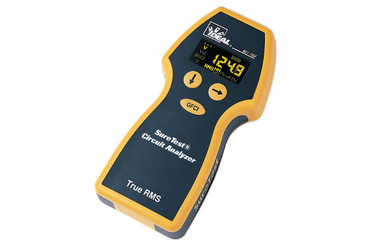
26. Circuit Analyzers
Technicians use these analyzers to check for different wiring conditions. For example, they can check for polarity reversals, arc faults, wiring, and much more.
27. Electrical Contractor Software
As an electrician, you know the importance of staying organized and efficient in your work. One way to streamline your business operations is by utilizing electrical contractor software. Electrical contractor software can help streamline processes, improve communication with clients and team members, and increase efficiency in project management.
Partnering with ServMan by WorkWave
ServMan by WorkWave is a comprehensive ERP software designed specifically for field service businesses, offering a wide range of benefits that can greatly enhance efficiency and productivity. Here are some key advantages of using ServMan by WorkWave:
1. Streamlined Communication: Allows you to easily communicate with your clients, staff, and vendors through automated messaging features. This ensures that everyone is kept informed and up-to-date on important information.
2. Enhanced Scheduling: Create and manage schedules for your field services with ease. This helps you optimize your workflow and ensure that appointments are efficiently organized.
3. Customer Management: Provides a centralized platform for managing customer information, including contact details, service history, and preferences. This allows you to provide personalized service and build strong relationships with your clients.
4. Billing Automation: Offers billing automation features that help streamline the invoicing process, reduce errors, and ensure prompt payment. This saves you time and effort while improving cash flow for your field service business.
5. Reporting and Analytics: Provides valuable insights through detailed reporting and analytics tools. This allows you to track key performance indicators, identify trends, and make data-driven decisions to optimize your business.
Closing Thoughts
Having the right tools is essential for any electrician to efficiently and effectively complete their work. From basic hand tools like screwdrivers and pliers to specialized equipment like circuit analyzers, each tool serves a specific purpose in ensuring the safety and functionality of electrical systems.
Utilizing electrical contractor software like ServMan by WorkWave can greatly benefit electrical businesses. The software helps streamline operations, improve communication, increase efficiency in project management, and ultimately lead to increased customer satisfaction. By using this software, electricians can save time on administrative tasks like invoicing and billing, allowing them to focus more on providing quality service to their clients. Ready to grow your business? Book a free demo today!

